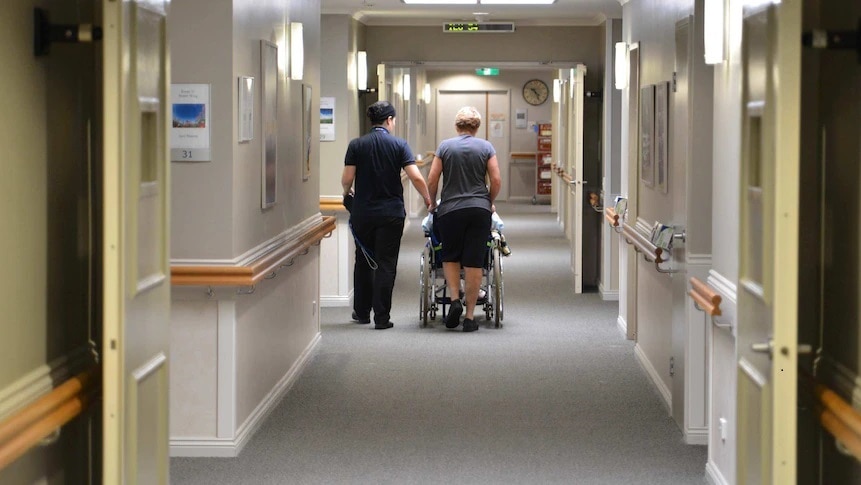The Federal Government has promised to pick up the bill for any potential pay rise for aged care workers in a submission to the Fair Work Commission (FWC).
Key points:
- The government has stopped short of nominating how much aged care wages should increase
- It says existing rates do not reflect the modern skills and demands of the role
- Aged Care Minister Anika Wells says gender pay equity is a priority
The independent wages umpire is considering a case brought forward by the unions, calling for a 25-per-cent pay increase for 200,000 residential and home care workers.
While stopping short of nominating how much wages should rise, the Commonwealth argued in its submission that the existing award rates do not reflect the value and skills of the sector.
Minister for Employment and Workplace Relations Tony Burke said the COVID pandemic had exacerbated pressures on the workforce and underlined the case for a pay increase.
“Right now, there is no doubt their work is undervalued. We need to change that,” he said.
“Our government is prioritizing these workers as we fight to get wages moving again.”
Unions celebrate commitment
The Health Services Union welcomed the government’s submission, arguing the aging population and changing expectations had made the roles more complex.
National president Gerard Hayes said the government’s submission was a shot in the arm for the sector.
“Older Australians will not get the care they deserve until we can attract and retain a workforce to look after them,” he said.
“The Government has understood this and taken action.
“We are hopeful the Fair Work Commission will make a decision that recognizes the work value of aged care.
“A decent pay rise is beyond overdue.”
The Interim CEO of employer group Aged and Community Care Providers Association Paul Sadler said the case for a pay rise was strongest for registered and enrolled nurses and personal care workers.
“It would not surprise me to see that the increase for these key workers will be certainly up towards that 25 per cent level,” he said.
“The sooner this decision is made the better, but we do support a staged implementation of the increase.”
An election promise
Lifting the pay of aged care workers was a key recommendation of the Royal Commission into Aged Care Quality and Safety’s final report last year.
During the election campaign, Labor promised if it won the government it would make a submission to the FWC in support of a pay rise for the workforce.
The commitment was criticized by then-prime minister Scott Morrison, who questioned how Labor would fund any increase, instead opting to give aged care workers across the country two standalone payments of $400.
Workforce shortages
Unions and industry groups have argued pay increases are needed to attract and retain skilled workers for the sector.
Aged Care Minister Anika Wells said a pay rise was the first step to addressing workforce shortages.
“We need more staff in aged care and a pay rise is the start of ensuring workers are rewarded for the crucial roles they play,” she said.
“One of the main causes of the gender pay gap is low pay and poor conditions in care sectors like aged care, where the majority of workers are women.
“Increasing wages in aged care is essential to ensuring that men and women are paid equally.”
If the unions’ case is successful, the FWC would vary the aged care award, the document outlining minimum pay rates and conditions for the sector.
That change could see the minimum wage for aged care workers rise by at least $5 an hour.
The minimum wage of a qualified personal carer would be bumped up from $23.09 to $28.86 an hour, dependent on salaries when the application was lodged.
Under the union’s proposal a level 1 aged care worker could see their weekly pay increased from just over $800 to more than $1,000.
The case has been before the FWC since 2020.
It is due to hear from the government and unions when it holds hearings this month.
.
